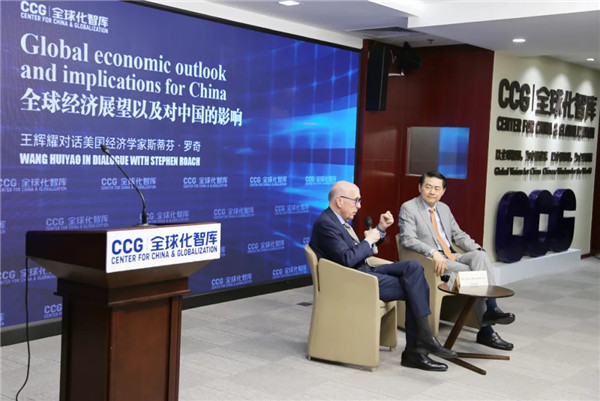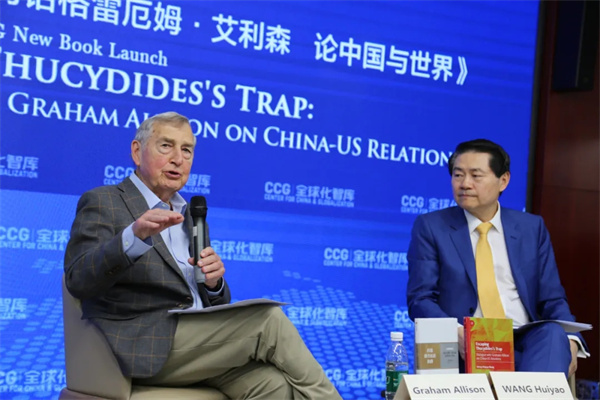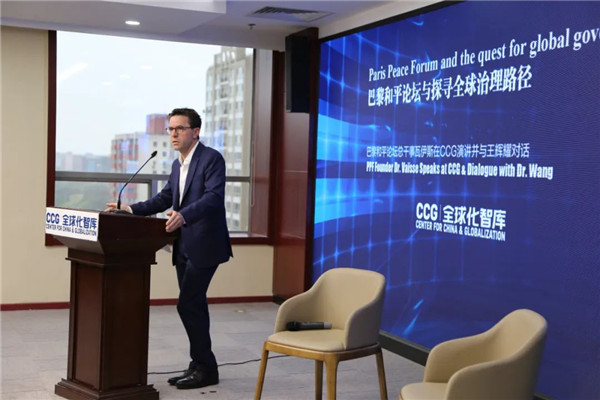New Book | Understanding the Global Power Shifts in the 21st Century: An Introduction to Soft Power and Great-Power Competition
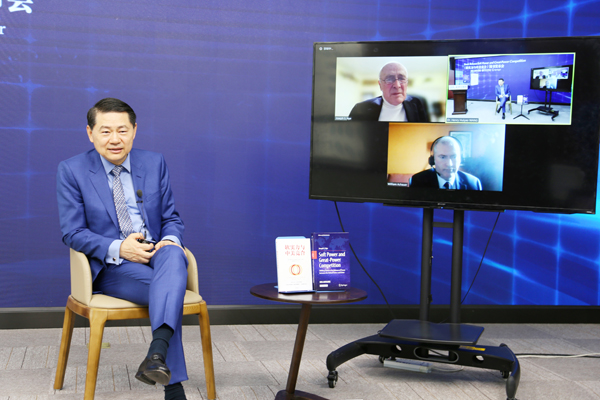
On April 28, 2023, a new book by the father of “soft power” Joseph S. Nye Jr., former dean of the Harvard Kennedy School, titled Soft Power and Great-Power Competition: Shifting Sands in the Balance of Power Between the United States and China, was released at the headquarters of the Center for China and Globalization (CCG) in Beijing. The book is part of the “China and Globalization” series co-edited by Dr. Henry Huiyao Wang, Founder and President of CCG and Dr. Mabel Lu Miao, Secretary of CCG. Dr. Wang contributed the Chinese preface of the book. The English edition of the book was published by Springer Nature, and the Chinese edition was published by the CITIC Press Group.
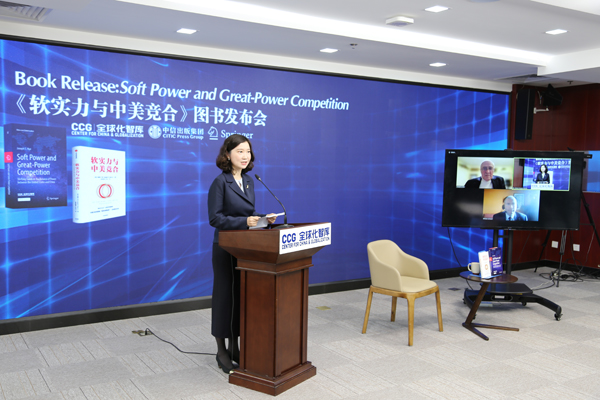
During the launch event, Professor Joseph S. Nye shared his thinking on the book’s theme, and discussed issues with Dr. Wang related to “cooperative rivalry ” between China and the US, the role of soft power, how to expand “friendly cycles” and shorten “adverse cycles”. Dr. Miao, William Achauer, Editorial Director for Business, Economics and Political Sciences, and Law at Springer Nature, Yonggang Hong, Chief Editor at CITIC Press Group and Leana Li, Regional Director for Books, China, Springer Nature attended the event and delivered speeches.
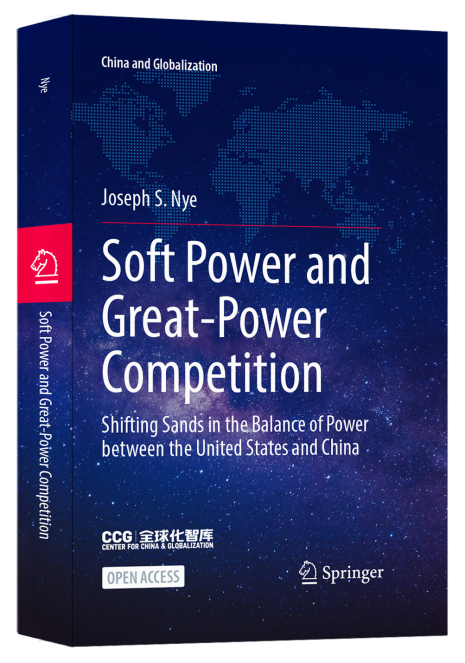
Soft Power and Great-Power Competition
Author: Joseph S. Nye Jr.
ISBN: 978-981-99-0716-8
Published in June, 2023
Publisher: Springer Nature
Link to Springer-Nature Book Download:
https://link.springer.com/book/10.1007/978-981-99-0714-4
In the 21st century, flourishing globalization has made the world more interconnected and interdependent unlike any time in human history. Through frequent interaction, huge advances have been made in science, technology and society with many countries, especially those in Asia, achieving tremendous economic and social progress, changing the global balance of power. In particular, the rise of China and other emerging countries, has ushered in a historic shift in global power. Joseph S. Nye Jr., the father of “soft power” and Harvard University professor has posed a thought-provoking question: “How do we manage that power transition from the west to east in a way which is beneficial for all countries and which doesn’t break down into great power rivalries, which are destructive?”
Nye is well known for developing the concept of “soft power,” the ability to influence others through attraction rather than coercion or payment. In his view, soft power doesn’t happen to be zero-sum. If China becomes more attractive in the United States, and the United States becomes more attractive in China – that can help both of them overcome their differences.
This open access book consists of essays selected from Joseph S. Nye, Jr.’s last three decades of writing and illustrate a variety of perspectives on the nature of power, the role of the United States in the world and US-China relations. Through this collection, it is hoped that readers will gain a better understanding of today’s global environment and find that while great power competition may be inevitable in a world as centers of power shift, cooperating to address transnational challenges can be a positive sum game. On April 28, 2021, CCG hosted a dialogue between CCG President Wang Huiyao and Joseph S. Nye Jr. during which global power shifts in the 21st century and the future of US-China relations were discussed. Nye presented his theory of a 20-year cycle in US-China relations and many other thought-provoking questions. The transcript of this dialogue is included as an appendix to this book for readers to explore and reflect.

Joseph S. Nye, Jr. is the University Distinguished Service Professor, Emeritus and former Dean of the Harvard’s Kennedy School of Government. He won a Rhodes Scholarship to Oxford University, and earned a PhD in political science from Harvard. He has served as Assistant Secretary of Defense for International Security Affairs, Chair of the National Intelligence Council, and Deputy Under Secretary of State for Security Assistance, Science and Technology. His most recent books include Do Morals Matter? Presidents and Foreign Policy from FDR to Trump (2021); Is the American Century Over? (2015); and The Future of Power (2011). He is a fellow of the American Academy of Arts and Sciences, the British Academy, and the American Academy of Diplomacy.
The contents of this book are divided into four main parts. Part One discusses the origins and political progress of the concept of “Soft Power”. Part Two explores soft power in the American experience, its sources and interaction with US foreign policy, as well as its ebb and flow in the age of Obama, Trump and Biden. Part Three examines the rise of and the opportunities and difficulties for Chinese soft power, focusing on China’s investment in soft power and how this demonstrates its commitment to a peaceful rise. Part Four provides a bird’s-eye view of power shifts in the 21st century and the interactions between the US as an established power and China as a rising power, while also reassuring readers that Thucydidean fears are unnecessary and a Cold War is avoidable. Ultimately, the US-China relationship is a “cooperative rivalry” where a successful strategy of “smart competition” is necessary and cooperation on transnational challenges like climate change, pandemics, cyberterrorism and nuclear proliferation, will serve to benefit not only China and the US, but the world as a whole.
Content
Part 1 The Role of Soft Power in Global Politics
Soft Power
The Limits of Soft Power
State Smart Power Strategies
Understanding Twenty-First Century Power Shifts
Soft Power: The Origins and Political Progress of a Concept
What is a Moral Foreign Policy?
Part 2 Soft Power in the American Experience
Soft Power and American Foreign Policy
Get Smart: Combining Hard and Soft Power
Obama the Pragmatist
American Soft Power in the Age of Trump
Trump’s Effect on US Foreign Policy
Can Joe Biden’s America Be Trusted?
After the Liberal International Order
Part 3 The Rise of Chinese Soft Power
As China Rises, Must Others Bow?
The Rise of China’s Soft Power
Hard Decisions on Soft Power: Opportunities and Difficulties for Chinese Soft Power
Xi Jinping’s Marco Polo Strategy
Does China Have Feet of Clay?
Perspectives for a China Strategy
Part 4 US-China Relations and the Role of Soft Power
The “Nye Report:” Six Years Later
The Dollar and the Dragon
Is China Overtaking America?
The Financial Crisis and US-China Misperceptions
Work with China, Don’t Contain It
The Future of U.S.-China Relations
The Kindleberger Trap
The Cooperative Rivalry of US-China Relations
The Future of U.S.-China Relations After Buenos Aires
For the US and China, Interdependence is a Double-Edged Sword
Cold War with China Is Avoidable
The Logic of US-China Competition
Appendix: Dialogue on US-China Balance of Power
■ A Collection of CCG’s Publication:
China and Globalization series
The “China and Globalization” series, co-edited by Dr. Henry Huiyao Wang, Founder and President of CCG and Dr. Mabel Lu Miao, Secretary-General of CCG, seeks to create a balanced global perspective by gathering the views of highly influential policy scholars, practitioners, and opinion leaders from China and around the world.
The first volume of the series, Consensus or Conflict?: China and Globalization in the 21st century is an unprecedented work made up of contributed articles by 38 authors, ranging from distinguished opinion leaders to scholars from around the world such as Pascal Lamy, Joseph S. Nye Jr., Edmund Phelps, Kishore Mahbubani, Lord Jim O’Neill, Wendy Cutler, Mr. Zhu Guangyao and He Yafei. In this unprecedented period of human history, they provide insights, new ideas and recommendations to the challenges we face in terms of policies for changing the “rules based world order”, global public health, climate change, education and migration, the digital and biosphere revolutions, and global governance. Since its launch on September 30, 2021, to critical acclaim, this book has received more than 210,000 downloads.In recognition of its innovation and impact in research on sustainability, it stood out among more than 800 works and won the “2022 China New Development Award” from Springer Nature Group.
Consensus or Conflict?Download at Springer-Nature:https://link.springer.com/book/10.1007/978-981-16-5391-9?page=1
The second volume of the series is The Asian 21st Century, authored by Singapore veteran diplomat Kishore Mahbubani. In his book, Mahbubani explains in detail how Asia will become the new engine of globalization in the 21st century. He argues that the 21st century will see the return of Asia to the center of the world stage, China’s peaceful rise and a reshaping of the world order. The book has received attention internationally and has been downloaded more than 1.93 million times since its launch on December 30, 2021.
Download at Springer-Nature:
The third book of this series is Transition and Opportunity: Strategies from Business Leaders on Making the Most of China’s Future. CCG invited 22 contributors including CEOs of well-known multinational corporations and presidents of foreign chambers of commerce in China to share invaluable insights, offering balanced and diverse perspectives on a range of issues related to China’s domestic development, international economic cooperation, and China-US competition. These insights are useful not only for the wider business community, but also for academics, policymakers, students, and anyone trying to deepen their understanding of this exciting period of “transition and opportunity” and make the most of China’s bright future. The book has been downloaded more than 100,000 times since its launch in February 2022.
Transition and Opportunity: Strategies from Business Leaders on Making the Most of China’s Future
Download at Springer-Nature:
The fourth volume of this series China and the World in a Changing Context: Perspectives from Ambassadors to China is made up of works from 24 Ambassadors to China, discussing a range of bilateral and multilateral issues, including trade and investment, regional economic cooperation, the “Belt and Road Initiative”, economic recovery from COVID-19 and China’s Fourteenth Five Year Plan. So far, this edition has been downloaded almost 70,000 times since its launch in March 2022.
 China and the World in a Changing Context: Perspectives from Ambassadors to China
Download at Springer-Nature:
China and the World in a Changing Context: Perspectives from Ambassadors to China
Download at Springer-Nature:
The fifth volume of the series is Dr. Henry Huiyao Wang’s work The Ebb and Flow of Globalization: Chinese Perspectives on China’s Development and Role in the World. This book focuses on globalization and China’s evolving role in the world, offering unique perspectives on a tumultuous period that began with Donald Trump’s election and ended with the outbreak of the Covid-19 pandemic. This period saw the global landscape reshaped by China’s continued rise, intensifying great power competition, and a public health crisis that has changed how we live. The essays center on three interconnected themes – China’s remarkable development under its policy of Reform and Opening-up, China’s deepening integration into the global economy and rise in an increasingly multipolar world, as well as the quest to reinvigorate global governance and multilateralism to address the pressing global challenges of the 21st century. The book was released in August, 2022.
The Ebb and Flow of Globalization: Chinese Perspectives on China’s Development and Role in the World
To encourage calm, rational discussion to share views, make sense of the momentous changes that were occurring in our world, and find ways to work together, CCG launched CCG Dialogue Series and converses with experts from different countries and disciplines that could help us put current events in context and explore solutions to our shared challenges. We share these talks in the form of a book so that readers could absorb the insights shared by our speakers, compare and contrast their perspectives, and enhance their understanding of important issues such as globalization, global governance and multilateralism, the global economy, our shared transnational threats, and China-US relations.
 Book Link:
Book Link:
https://link.springer.com/book/10.1007/978-981-19-3846-7
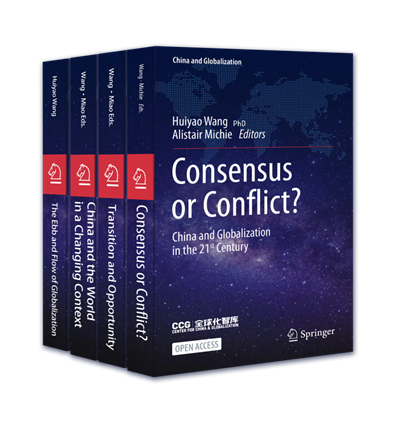

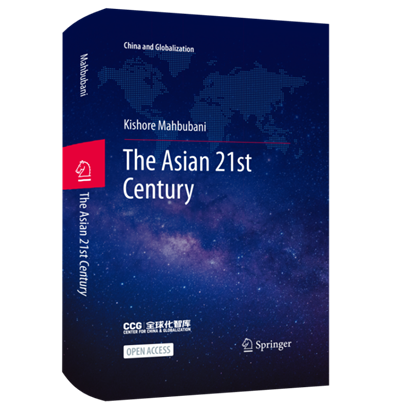
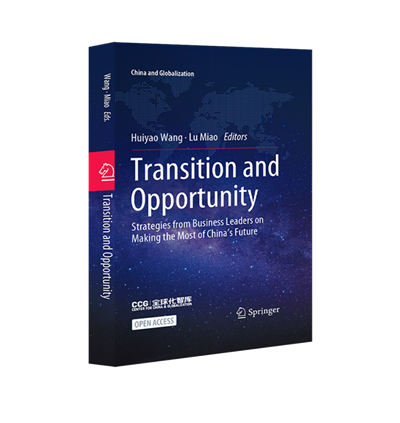
 China and the World in a Changing Context: Perspectives from Ambassadors to China
China and the World in a Changing Context: Perspectives from Ambassadors to China





